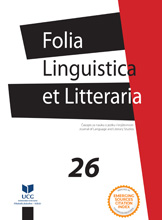RECLAIMING HISTORIES/REWRITING DESTINIES: MRS. WOOLF AND ORLANDO IN UNEARTHING THE BURIED
RECLAIMING HISTORIES/REWRITING DESTINIES: MRS. WOOLF AND ORLANDO IN UNEARTHING THE BURIED
Author(s): Milica NenezićSubject(s): Structuralism and Post-Structuralism, Theory of Literature, British Literature
Published by: Filološki fakultet, Nikšić
Keywords: history; fiction; philosophy; feminist literary criticism; poststructuralism;
Summary/Abstract: History is usually written by the winners; those who lose retain their own. The extent to which these differ and whether the differences affect the fate of mankind are all issues that require constant rendering and re-examination. The future confidently retains the answers, but do these answers change the circumstances? Can philosophy, feminist literary criticism or post-structural theories obscure the meaning of fiction? We are composed of strange particles that create our being and identity, which does not likely pave the way to our becoming true by solely ‘static’ existence, but by one that unites the past, present and the future. Such particles placed on the platform of literary expression sometimes have the character of a more permanent testimony to history, either written, or to-be-written. One figure, who struggled to raise our awareness and to remind us that the essay can represent a dialogue, that the reader carries special importance and a role in both the creation and reception of artistic skills, yet that language and meaning do not have a stable structure, was Virginia Adeline Stephen Woolf, who was rewriting and reclaiming both individual and common histories. Reflecting on the dilemmas and perplexities of both historical and fictional structural norms in literature, Mrs. Woolf unobtrusively portrayed an androgynous and ever-living creature in her novel Orlando, who seeks, among other feats, to re-evaluate the importance of witnessing and re-examining history.
Journal: Folia Linguistica et Litteraria
- Issue Year: 2019
- Issue No: 26
- Page Range: 127-141
- Page Count: 15
- Language: English

